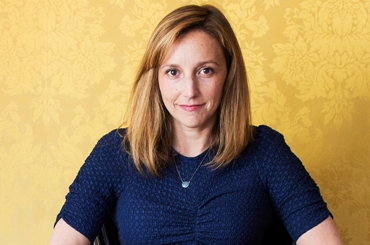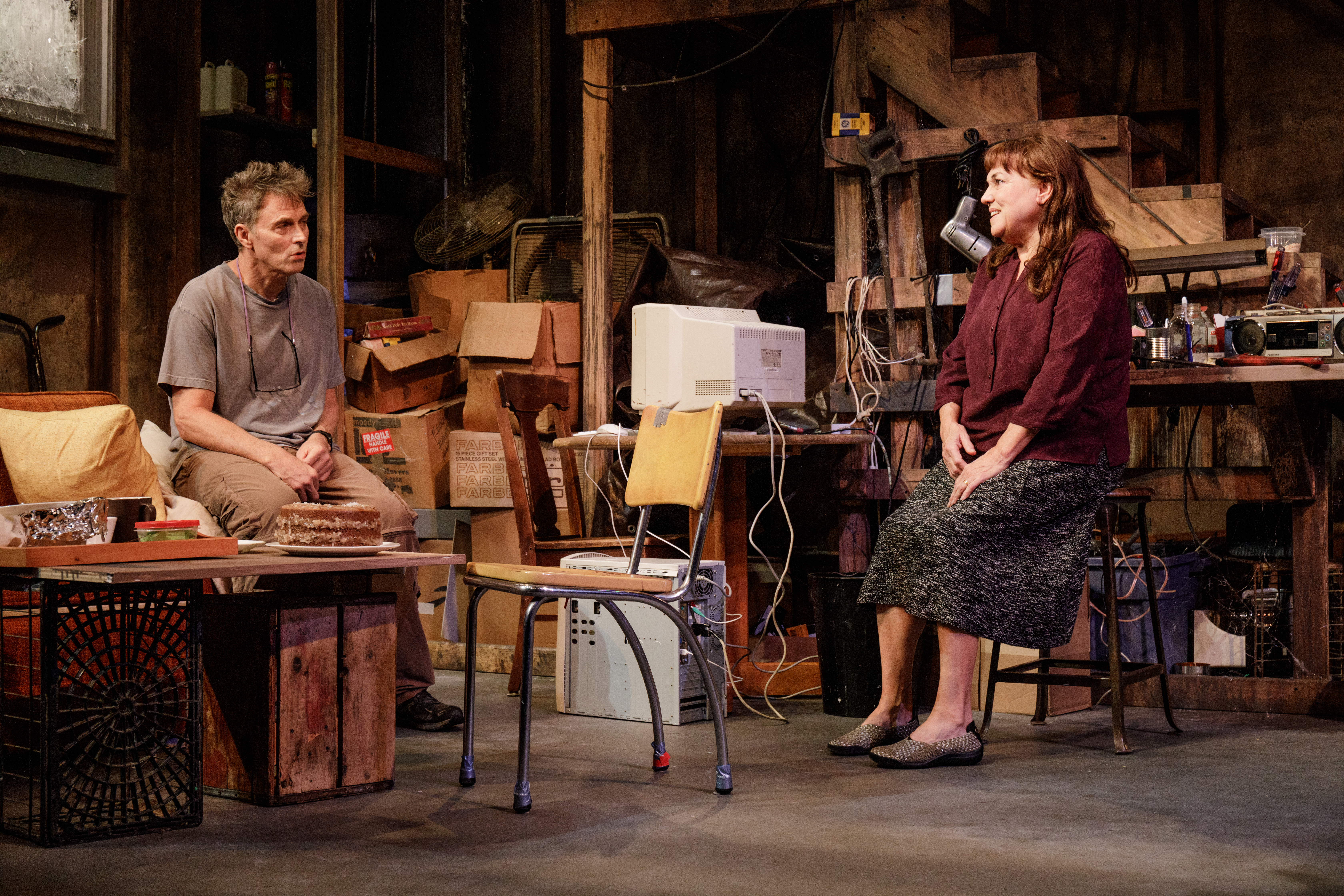Talking to theater director Adrienne Campbell-Holt is a breath of fresh air for any avid theater goer or film buff. She’s a big believer in not only working primarily with women on the projects she chooses, but she’s also drawn to plays that resonate with audiences of all ages.
Campbell-Holt, the Founding Artistic Director of Colt Coeur, a Brooklyn-based theater company, served as Associate Director on the Broadway production of “Dear Evan Hansen” and has a long résumé filled with works by both experienced and new playwrights, among them Ruby Rae Spiegel, Ana Nogueira, Nikole Beckwith, and Eliza Clark.
For the new play “Downstairs,” Campbell-Holt is reuniting with playwright Theresa Rebeck. Featuring actors and real-life siblings Tyne and Tim Daly, the play is a dark drama with psychological twists and turns that involve domestic abuse and dysfunctional family histories. Campbell-Holt and Rebeck previously worked together on “What We’re Up Against,” “The Nest,” and other productions.
We talked to Campbell-Holt about “Downstairs,” what it’s like directing the Daly siblings, and why shows with social relevance and substance are so important to her.
“Downstairs” is playing at the Cherry Lane Theatre until December 22.
W&H: What’s it like being a female director in 2018?
ACH: I think it’s a really exciting and inspiring time to be a female director. I feel so energized by all of the playwrights that are putting women front and center and are allowing women to have all the complexity men have had for many hundreds of years — especially in our culture, where we are having really interesting conversations about how we internalize the impact of our conscience, actions, and behaviors.
I’ve been moved by so many young playwrights who are half a generation or a generation below me and the terms they are familiar with from their women’s studies classes. These are different even from what I was exposed to coming from an extremely progressive family. For example, I remember when [“Dry Land” playwright] Ruby Rae Spiegel was talking to me about emotional labor, and that term was new for me. I have a better understanding from working with playwrights spanning from early in their careers to having an incredible amount of experience under their belt, like Theresa. Everyone is feeling like they have not just permission but really encouragement from our audiences and artistic directors and producers to go further and no longer feel like our female characters have to be sympathetic all the time.
I’m also a huge film person. I love so many of the female filmmakers that are telling stories that are new and surprising. Movies reach so many more people than most theater productions. Marielle Heller [director of “The Diary of a Teenage Girl” and “Can You Ever Forgive Me?”] and Desiree Akhavan [director of “The Miseducation of Cameron Post”] are both very exciting to me.
W&H: How important is it for you to work with female artists?
ACH: It is essential. I love men, too, but I tend to be interested in people who are looking at things in a different way. Often that is women and people of color. That’s because of the culture this country raises. It still feels like the patriarchy and how the education system is rooted.
I tend to work with really sensitive collaborators and they tend to be women. I seek out female playwrights, designers, actors, and producers because there’s just a holistic thoughtfulness that isn’t cultivated the same way with men. In addition, the humanity and compassion that is part of the process are more likely to be involved when you work with women.
W&H: That’s a good segue to Theresa Rebeck. Please talk about your collaboration with her and how involved she was in this process.
ACH: I have been very lucky to have worked with Theresa on five productions. We started working on “Downstairs” last summer with the same cast in Dorset, Vermont. Theresa and I were lucky to have a few months before rehearsal there and had the chance to sit around with our lead actors Tyne, Tim, and John [Procaccino] [and talk] about sibling relationships. We told stories to each other about our parents and talked a lot about the “Rashomon” idea of how two people can have different recollections of the same event and how even siblings characterize their childhood completely differently, even if they lived in the same house. Theresa listened intently and got their permission to include some of these stories in the script. Even more than the stories, specifically, the conversation built such a family dynamic between us, and some of it went into the play.
I had worked with John and Tim before on other shows and had gotten to know Tyne through Tim. It’s really special to do a show out of town, and Vermont is a lovely but sleepy community where we spent a lot of time together out of rehearsal, having dinner and going swimming together. That bond made the work so much deeper and fast-tracked the trust you need to do what is almost like a thriller of a play, weaving in that dark psychology but feeling like we can go there emotionally, yet feel safe. The three of them have each other’s back.
W&H: What is your directing method — do you spend a lot of time in rehearsals and at the theater long after it starts?
ACH: I’m in New York now. I started rehearsals for a different play yesterday and I’ve done two other workshops since we opened “Downstairs”. But I’m there at least once a week checking in with everyone, watching the show, and giving notes. I love to rehearse and never want it to feel rushed for the actors.
When we got ready for the New York run, it was challenging because both Tyne and Tim were working on TV shows simultaneously [Tyne was shooting “Murphy Brown”; Tim was working on “Madam Secretary”]. They are just superhuman to be doing both at the same time, but they both rose to the challenge. We had slightly limited rehearsal hours so we were lucky that we had built the play last summer. The two of them trusted that it worked and we knew that as long as they learned their lines and blocking again, it would come back like muscle memory.
Tyne said a beautiful thing about how the first time she did the play, she just barely got it in her body. Now the second time, she says it’s in her heart, and she doesn’t have to think as much. She hopes to do the play a third time because she thinks it has the potential to be in her bones.
W&H: Cherry Lane is a small theater, adding a sense of chaos to the environment in which the characters live. What has that experience been like in terms of direction and blocking?
ACH: It fits better at the Cherry Lane in some ways because when you think of a basement, you don’t think of an airy, open space. There’s a little more claustrophobia in that space, too, which is useful for the actors. If they take one step, they are on top of the other person [in the scene] and have to find other ways to inhabit the space.
I like challenges and I’ve never done a remount like this. The play is not exactly a remount because it’s a different space. You should always somehow start fresh even if you return to the same thing — eventually, you want to discover something new at the moment that you’re in. By having a different footprint, it was a good reason to start fresh.
W&H: The play deals with important issues such as domestic abuse and dysfunctional family relationships. Can you talk about taking on a play like “Downstairs” and its social relevance and what the audience’s response has been like?
ACH: Many people who I know but maybe haven’t known for that long have shared things after the play with me about how powerful “Downstairs” was for them. Some say they had to put their head down and that it is healing in the way that it ends. One family friend came on opening night and said the experience was very overwhelming for her but she was also grateful to have seen it. So often art can really allow catharsis or allow people to think something difficult in their own personal context. Watching a story about other people can be healing.
Also, Theresa is so prolific, and yet I agree that there is something that is very singular in the atmospheric mood in this play, and how emotionally intense and intimate it is. It has been so cool to see people get to think about her work in a completely different way.








